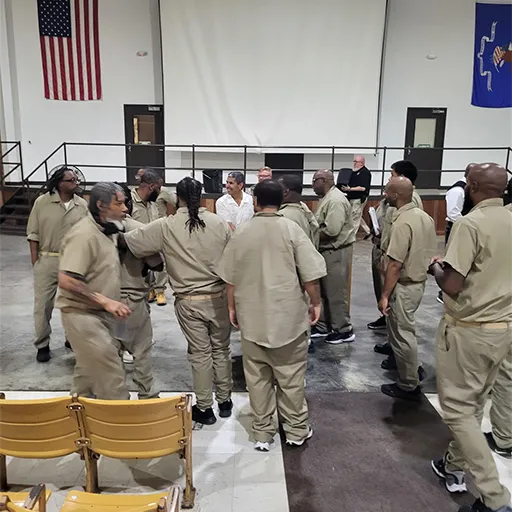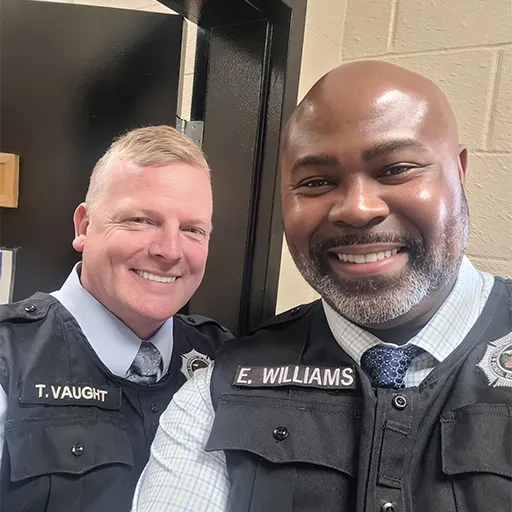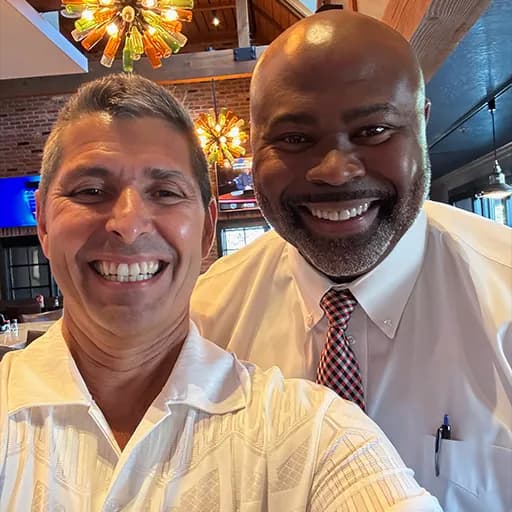
On Monday morning, the Senior Deputy Regional Director for the North Central Region, Eric Williams, picked me up at my hotel in Kansas City. We began a long drive north to the small town of Owatonna, Minnesota, where we would stop overnight in anticipation of my presentation at two federal prisons on Tuesday and Wednesday.
The drive took less than four hours, but the lessons from that conversation will stay with me much longer. As we crossed the plains, I had the privilege of learning more about Eric’s motivation for building a career within the Federal Bureau of Prisons (BOP)—and about his philosophy of leadership.
A Career Built on Service and Growth
Eric grew up in a disciplined, military household that valued structure, teamwork, and accountability. Football dominated his youth, shaping his competitive spirit and sense of discipline. After graduating college, he worked in several fields, including a position as a probation officer—a role that gave him firsthand insight into rehabilitation and reintegration.
He joined the Bureau of Prisons as a correctional officer at FCI Beaumont, where he dedicated himself to learning every aspect of the system. Within five years, he promoted to case manager at USP Beaumont, and from there continued to rise through the ranks at different institutions—eventually serving as Associate Warden, Warden, and then SES Warden before promoting to his current position as Senior Deputy Regional Director, working under Regional Director Andy Matevousian.
For those unfamiliar, “SES” stands for Senior Executive Service—the highest tier of federal leadership. SES Wardens oversee entire institutions and serve as key decision-makers across regions. Their roles carry national significance in shaping policy, culture, and institutional priorities.

A Philosophy of Leadership
As we talked, I recognized qualities I deeply admire—communication, empathy, and consistency. Eric spoke about the importance of building morale, listening to his teams, and ensuring that every staff member feels both valued and accountable.
His approach reminded me of one of the great mentors I studied while in prison: Zig Ziglar, who taught that “You can get everything in life you want if you will just help enough other people get what they want.”
That principle lies at the core of both leadership and rehabilitation. When people inside the system feel seen, heard, and encouraged to grow, they become part of a solution. And when staff lead with that mindset, they help advance the Bureau’s mission while strengthening the human spirit of those in custody.
Shared Commitment to Preparation and Reform
As we traveled, I told Eric about the work we’re building at Prison Professors Charitable Corporation—a national, self-directed reentry program that now serves more than 2,500 people across the federal system. Participants use our platform to memorialize their preparation for success: journaling their growth, completing book reports, drafting release plans, and documenting their daily progress.
These individuals are making conscious choices to avoid disciplinary infractions, contribute to their communities, and prepare for lives of meaning and contribution.
Eric listened carefully and asked thoughtful questions about how our data and educational materials support the Bureau’s goals for rehabilitation and reintegration. His openness affirmed for me that positive collaboration between public- and nonprofit-sector leaders is possible—and essential.
Gratitude for Leadership that Listens
For me, the trip to Minnesota opened an opportunity to listen and learn. Leadership begins with listening, and reform succeeds when we build relationships grounded in trust, transparency, and shared purpose.
At Prison Professors, we’ll continue advancing our mission—to help every person in prison prepare for success upon release, and to advocate for policies that reward effort and merit. I’m grateful for the opportunity to share that vision with influential leaders in the Bureau of Prisons, including Deputy Director Josh Smith, Regional Director Andy Matevousian, and Senior Deputy Regional Director Eric Williams–who is a true credit to the agency, fully committed to the pursuit of excellence.

